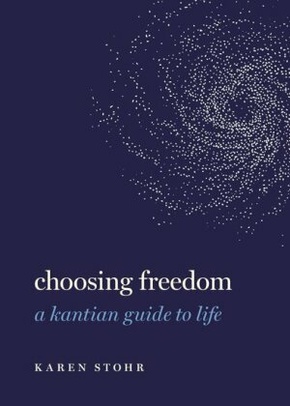Choosing Freedom - A Kantian Guide to Life
| Verlag | Oxford University Press |
| Auflage | 2022 |
| Seiten | 328 |
| Format | 13,6 x 2,2 x 18,5 cm |
| Print PDF | |
| Gewicht | 360 g |
| Artikeltyp | Englisches Buch |
| Reihe | Guides to the Good Life |
| EAN | 9780197537817 |
| Bestell-Nr | 19753781EA |
Could a long-dead German philosopher have anything useful to say about how you should live your life? In the case of Immanuel Kant, the answer is yes. Although Kant is best known for his abstract ethical writings, you might be surprised to learn that this philosophical giant had things to say about gossiping, doing favors, getting drunk, telling white lies, and being a good dinner party guest. This book will help you understand the essential framework of Kant's ethical theory, with its emphasis on rationality, freedom, and hopefulness. It will show you what it means to live in a Kantian way, and how valuable it can be to do so.
An exploration of everything Kant's philosophy can teach us about being the best people we can be, from using our human reasoning to its fullest potential to being affably drunk at dinner parties.
Immanuel Kant is well known as one of the towering figures of Western philosophical history, but he is less well known for his savvy advice about hosting dinner parties. This philosophical genius was a man of many interests and talents: his famously formal and abstract ethical system is only part of his story. But Kant not only made a profound impact on how people think about big questions like how to treat one another--he also offered wise insights on things people confront in everyday life: things like gossip, friendship, manners, self-respect, cheerfulness, gratitude, mockery, contempt, and yes, dinner parties. In this book, philosopher Karen Stohr shows you how Kant's whole ethical picture fits together. It's a picture that is as relevant and useful now as it was in the 18 th century--and maybe even more so.
A Kantian way of living means using reason to guide your choices so that your life reflects your true nature as a free, rational being. This nature is one we share with others; Kantianism emphasizes the fundamental dignity and equality of each person. It presents an ideal for how we should live together without downplaying the challenges we face in the actual world. Though realistic about human weaknesses, Kant remained optimistic about our capacities and possibilities. He had great faith in the ability of human reason to point us in the direction of moral progress and to get us there. Each of us has the power within us to know and choose the right path--we just have to be willing to make that choice, and to discover how worthwhile life can be in the process.
Inhaltsverzeichnis:
Part One: Kantian Basics
Chapter 1 - Getting to Know Kant
Chapter 2 - Freedom
Chapter 3 - Human Nature
Chapter 4 - Moral Commitment
Chapter 5 - The Categorical Imperative: Equality
Chapter 6 - The Categorical Imperative: Dignity
Chapter 7 - The Categorical Imperative: Community
Chapter 8 - Love and Respect
Chapter 9 - Kantian Duties
Part Two: Moral Assessment
Chapter 10 - Knowing Ourselves
Chapter 11 - Judging Ourselves
Chapter 12 - Judging Others
Part Three: Kantian Vices
Chapter 13 - Servility: Acting Like a Doormat
Chapter 14 - Arrogance: Being Full of Ourselves
Chapter 15 - Contempt: Looking Down on Others
Chapter 16 - Defamation: Spreading Gossip
Chapter 17 - Mockery: Making Fun of Others
Chapter 18 - Deceitfulness: Bending the Truth
Chapter 19 - Drunkenness: Losing Our Grip on Reason
Part Four: Kantian Life Goals
Chapter 20 - Personal Development: Making Something of Ourselves
Chapter 21 - Stoic Cheerfulness: Learning to Grin and Bear It
Chapter 22 - Judicious Reserve: Knowing When to Shut Up
Chapter 23 - Useful Beneficence: Lending a Genuinely Helpful Hand
Chapter 24 - Heartfelt Gratitude: Acknowledging Our Debts
Part Five: Socializing, Kantian-Style
Chapter 25 - Friends and Frenemies
Chapter 26 - A Kantian Love Life
Chapter 27 - Good Manners
Chapter 28 - Dinner Parties without Drama
Part Six: Looking Forward
Chapter 29 - Staying Hopeful
Chapter 30 - Kant as a Guide to Life
Bibliography

